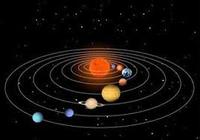
Gravity and Our Solar System
Authored by Olivia Henderson
Science
8th Grade
NGSS covered
Used 5+ times

AI Actions
Add similar questions
Adjust reading levels
Convert to real-world scenario
Translate activity
More...
Content View
Student View
11 questions
Show all answers
1.
MULTIPLE CHOICE QUESTION
30 sec • 1 pt
What role does gravity play in the formation of planets within a protoplanetary disk?
It causes the disk to expand and disperse
It attracts dust and gas to form planets
It prevents the accumulation of particles
It stops the rotation of the disk
Tags
NGSS.HS-PS2-4
2.
MULTIPLE CHOICE QUESTION
30 sec • 1 pt
Explain how the collapse of a nebula leads to the formation of a spinning disk.
The nebula explodes and forms a disk
Gravity pulls particles together, causing them to swirl and form a disk
The nebula cools down and solidifies into a disk
Magnetic forces align particles into a disk
3.
MULTIPLE CHOICE QUESTION
30 sec • 1 pt
What evidence do scientists use to reconstruct the history of our solar system?
Observing patterns in distant nebulae
Measuring the temperature of the sun
Analyzing the color of planets
Studying the speed of comets
Tags
NGSS.HS-ESS1-6
4.
MULTIPLE CHOICE QUESTION
30 sec • 1 pt
How do tides on Earth demonstrate the long-range effects of gravitation?
Tides are caused by the Earth's rotation
Tides are influenced by the gravitational pull of the moon and sun
Tides are a result of ocean currents
Tides are caused by the Earth's magnetic field
Tags
NGSS.HS-PS2-4
5.
MULTIPLE CHOICE QUESTION
30 sec • 1 pt
What is the significance of observing tidal patterns for understanding gravitational effects?
Tidal patterns show the Earth's magnetic field strength
Tidal patterns help predict weather changes
Tidal patterns illustrate the gravitational interaction between Earth, the moon, and the sun
Tidal patterns indicate the Earth's rotation speed
Tags
NGSS.HS-PS2-4
6.
MULTIPLE CHOICE QUESTION
30 sec • 1 pt
In what way does the initial velocity of particles in a nebula affect the formation of a protoplanetary disk?
It causes particles to move away from each other
It contributes to the swirling motion as particles are drawn together by gravity
It stops the particles from forming a disk
It increases the temperature of the nebula
7.
MULTIPLE CHOICE QUESTION
30 sec • 1 pt
What is the relationship between the formation of stars and planets in a nebula?
Stars form first, and planets form from leftover material
Planets form first, and stars form from leftover material
Stars and planets form simultaneously from the same material
Stars and planets form independently of each other
Access all questions and much more by creating a free account
Create resources
Host any resource
Get auto-graded reports

Continue with Google

Continue with Email

Continue with Classlink

Continue with Clever
or continue with

Microsoft
%20(1).png)
Apple
Others
Already have an account?
Similar Resources on Wayground

10 questions
MCCB Quiz
Quiz
•
12th Grade

15 questions
Cell Respiration
Quiz
•
9th Grade

10 questions
RMI Quiz 1
Quiz
•
University

10 questions
The History of Science
Quiz
•
12th Grade

9 questions
Nature of Inquiry and Research
Quiz
•
11th Grade

15 questions
PBFP_Pure Substance Or Mixture?
Quiz
•
University

15 questions
WATER SUPPLY
Quiz
•
University

10 questions
DRRR Q4
Quiz
•
12th Grade
Popular Resources on Wayground

15 questions
Fractions on a Number Line
Quiz
•
3rd Grade

20 questions
Equivalent Fractions
Quiz
•
3rd Grade

25 questions
Multiplication Facts
Quiz
•
5th Grade

29 questions
Alg. 1 Section 5.1 Coordinate Plane
Quiz
•
9th Grade

22 questions
fractions
Quiz
•
3rd Grade

11 questions
FOREST Effective communication
Lesson
•
KG

20 questions
Main Idea and Details
Quiz
•
5th Grade

20 questions
Context Clues
Quiz
•
6th Grade
Discover more resources for Science

22 questions
Phases of the moon
Quiz
•
8th Grade

10 questions
Exploring the Rock Cycle
Interactive video
•
6th - 8th Grade

20 questions
Waves and Wave Properties
Quiz
•
6th - 8th Grade

10 questions
Understand Ecosystem Roles and Energy Flow
Interactive video
•
6th - 8th Grade

8 questions
Amoeba Sister Asexual vs Sexual Reproduction
Interactive video
•
8th Grade

10 questions
Exploring the Rock Cycle: Types and Formation
Interactive video
•
6th - 8th Grade

20 questions
Heredity Punnett square review
Quiz
•
8th Grade

10 questions
Exploring Weathering, Erosion, and Deposition Processes
Interactive video
•
6th - 10th Grade
